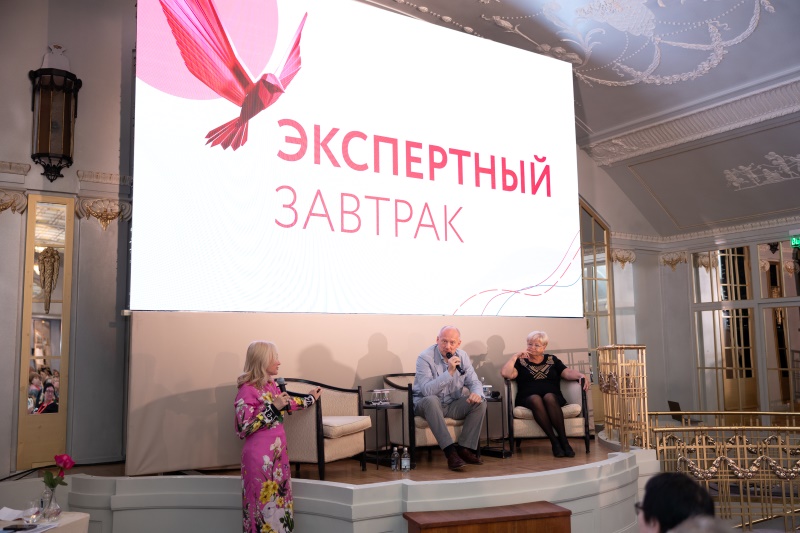
St. Petersburg and Nizhny Novgorod welcome Expert Breakfasts to talk on women's reproductive health

About 200 gynecologists from St. Petersburg and Nizhny Novgorod took part in Expert Breakfasts organized by Petrovax in May. This new format of the event created an opportunity for gynecology specialists to vote in a special application and select their own topics for discussion. The experts thus were able to expose the most important myths and share opinions on the issues.
The specialists focused on pelvic inflammatory diseases (PID) as one of the most common causes of reproductive disorders in women, chronic endometritis and endometriosis. The issue of iron deficiency anemia (IDA) was also explored at the events.
The expert sessions featured the following specialists:
- V.F. Bezhenar, MD, PhD, Head of the Department of Obstetrics, Gynecology and Neonatology, Head of the Department of Obstetrics, Gynecology and Reproductology, Head of Obstetrics and Gynecology Clinic of Academician I.P. Pavlov FSPbSMU; Chief External Obstetrician-Gynecologist of the Ministry of Health of Russia in the North-West Federal District; Chief External Obstetrician-Gynecologist of St. Petersburg Health Committee.
- N.I. Tapilskaya, MD, PhD, Head of the Reproductology Department of FSBSI The D.O. Ott Research Institute of Obstetrics, Gynecology and Reproductology, Professor of the Department of Obstetrics and Gynecology of SPbSPMU.
- G.R. Bayramova, Honored Physician of Russia, MD, PhD, Professor of the Department of Obstetrics and Gynecology, Institute of Professional Education of FSBI Academician V.I. Kulakov NMRC OGP of the Ministry of Health of Russia.
- E.V. Mozgovaya, MD, PhD, Leading Researcher of FSBSI The D.O. Ott Research Institute of Obstetrics, Gynecology and Reproductology, Professor of the Department of Obstetrics, Gynecology and Reproductology of SPbSU.
- T.P. Zefirova, MD, PhD, Professor of the Department of Obstetrics and Gynecology, KSMA - branch of FSBEI FPE RMACPE MOH Russia (Kazan).
The experts believe that PID drives up the risks of infertility, pregnancy failure, adhesions and chronic pelvic pain.
Vitaly Bezhenar focused on endometriosis, one of the common gynecological diseases, often clinically presenting itself with pain syndrome. Despite surgical treatment, pain syndrome may persist in 28% of cases and worsen the quality of life for the patient. The professor revealed that up to 15% of women of reproductive age get diagnosed with endometriosis.
The incidence of infertility is increased in women suffering from external genital endometriosis and is associated with pelvic adhesions. Adhesions both lead to infertility, chronic pelvic pain and bowel obstruction and also increase the risk of intraoperative and postoperative complications during surgeries afterwards. Drugs with an anti-adhesive and anti-inflammatory mechanism of action may be useful in combination therapy.
The experts have presented the findings of the study showing that Longidaza® contributes to a lower pain syndrome and makes adhesions less prevalent. Physicians also speak about chronic endometritis as one of the causes of infertility; it is an inflammatory disease that occurs when the uterine cavity becomes infected. The most dangerous consequence of chronic endometritis is impaired fertility.
Natalia Tapilskaya revealed that acute and chronic endometritis is treated with antibacterial drugs, an option that is often insufficient to make a complete recovery. The experts stress the comprehensive approach in treating the disease.
Gyuldana Bayramova presented the results of the study involving Longidaza®, stating that the drug was able to restore the morphological structure in the endometrium due to its antifibrotic, anti-inflammatory and immunomodulatory effects. The study revealed that the drug helped to reduce the biofilm matrix biomass created by various causative agents of PID and increase the efficacy of antibiotics against bacteria in biofilms.
The gynecologists also thoroughly explored the issue of iron deficiency anemia (IDA). The experts busted the myths surrounding IDA and stressed the need to prevent iron deficiency in the body.
Elena Mozgovaya delved into the problem of iron deficiency anemia in women. Iron deficiency can cause fatigue, weakness, dizziness, headaches, flavor and smell reversion, brittleness and damage to nails and hair.
Anemia affects approximately 7 million women of reproductive age in Russia. An adequate nutrition is not enough for a modern woman to prevent anemia, let alone to treat it. An adult needs to take about 18 mg of iron every day. During pregnancy, the body needs more iron: 18 mg/day in the first trimester and 33 mg/day in the third trimester.
Tatyana Zefirova noted that we can and should combat IDA, but a much better option would be to prevent anemia in your body in the first place and maintain adequate iron levels, especially during menstruation. The latest generation iron complex with vitamins B and C and folic acid Vitaferr® helps to maintain adequate iron levels and is also approved for pregnant women. Dr. Zefirova emphasized that normal iron levels are vital to maintain both for women of reproductive age and postmenopausal women.
For more details on the event, check out the video:


